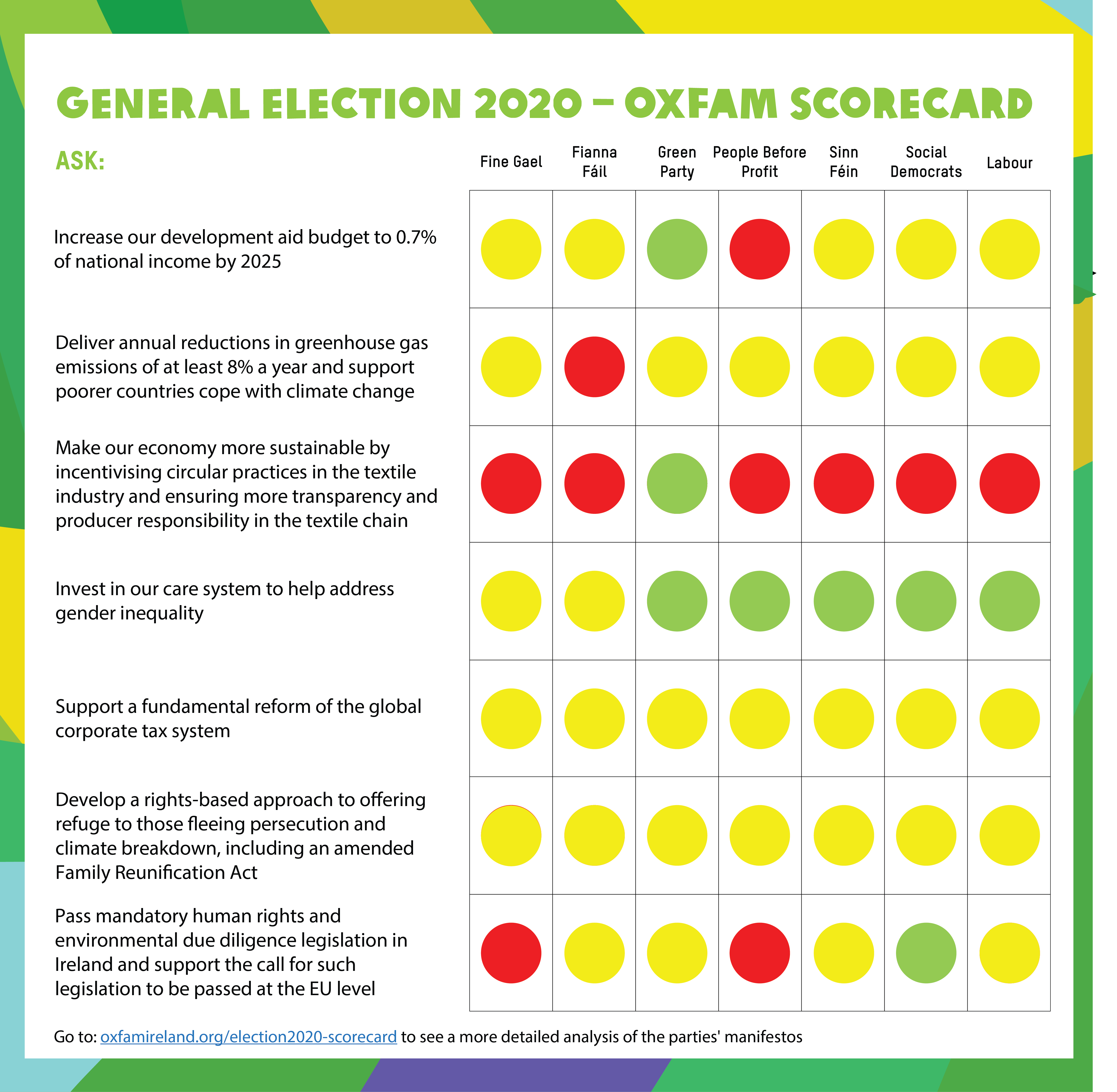- 4 min read
- Published: 4th February 2020
Know their score: Where the parties stand on GE2020 issues
At the start of the election campaign, we released our manifesto highlighting the most pressing global issues we want the next government to address – issues such as the climate crisis, sustainability, tax justice, gender equality and migration.
We have since reviewed all the main parties’ manifestos against the seven asks in ours and have created a scorecard highlighting their position on these issues.
In general, the Green Party and the Social Democrats scored the highest, while Fianna Fáil and Fine Gael scored the lowest, with the other parties falling somewhere in between.

1. Increase Ireland’s development aid budget to 0.7% of national income by 2025
Most parties (except People Before Profit) make a clear reference and commitment to increasing Ireland’s aid budget, but only the Green Party commits to reaching the target of providing 0.7% of national income to the aid budget by 2025. Sinn Féin, the Labour Party, Fianna Fáil and the Social Democrats do not set a specific date for when the target will be reached, while Fine Gael have set 2030 as their deadline.
2. Deliver annual reductions in emissions of at least 8% a year, and support poorer countries to cope with the climate emergency
Most parties commit to some level of emissions reduction, with the Green Party, People Before Profit and the Labour Party having by far the most ambitious targets. However, it is disappointing that none of the parties have committed to supporting poorer countries to cope with the climate crisis. The effects of climate change are hitting the most vulnerable hardest, and people in poorer countries are suffering with more frequent droughts and other climate-related disasters.
3. Support sustainability by incentivising circular economy practices in the textile industry and ensuring more transparency and producer responsibility in the textile chain.
The corporate world has a huge impact on sustainability. Every decision can affect the most vulnerable people and ecosystems and can threaten livelihoods and exacerbate poverty.
The textile sector, especially in terms of fast fashion, has huge potential in terms of circular practices. We need strong regulations to ensure that tonnes of clothing don’t end up in the landfill every year and to secure living wages and good working conditions for workers.
The Green Party is the only party that refers to the circular economy in its manifesto committing ‘to gradually move Ireland from a linear economy to a circular one. This will be done by developing a stronger recovery industry, reducing imported goods, and developing an associated manufacturing industry.’ Unfortunately, none of the other parties mention how the circular economy could be developed in the textile sector in their manifestos.
4. Invest in our care system to help address gender inequality
When we think of gender inequality, our minds tend to leap to wage packets and glass ceilings. But for women and girls, the gender gap may be better illustrated by the countless hours they spend caring for others, as well as cooking and cleaning. Women and girls carry out more than three-quarters of unpaid work in the world and make up two-thirds of the paid care workforce.
So, considering how care work and gender equality are so interlinked, it is good news that all parties acknowledged the important role care has in our society and pledge to support care work. The strongest commitments to invest in our care system were made by the Green Party, Sinn Féin, People Before Profit, the Labour Party and the Social Democrats.
5. Support a fundamental reform of the global corporate tax system
All parties agree that the current system is flawed, that corporate tax avoidance is a problem and that engagement is needed with the OECD BEPS corporate tax reform process. However, no party commits to supporting a fundamental reform of the corporate tax system, as set out by Oxfam Ireland. Some parties go further than others, with the Labour Party, the Social Democrats and People Before Profit committing to a minimum effective tax of 12.5 percent and Sinn Féin supporting greater transparency and ending the Intellectual Property loophole and the Apple Case appeal to the European Court of Justice. Meanwhile, People Before Profit and the Green Party support the ‘Robin Hood’ tax on financial transactions.
6. Develop a rights-based approach to offering refuge to those fleeing persecution and climate breakdown, including an amended Family Reunification Act
Most parties (except Fine Gael and Fianna Fáil) commit to ending the Direct Provision system. However, there is no solid commitment from any of the parties with regards to reforming the EU asylum system or supporting EU search-and-rescue missions. Millions of people are being forced to leave their homes due to conflict, persecution and disaster. So, it is important to ensure we have a migration system based on human rights, and international law that promotes inclusivity, transparency and accountability.
7. Pass mandatory human rights and environmental due diligence legislation in Ireland and support the call for such legislation to be passed at the EU level.
Although some businesses and financial institutions are already taking steps to meet their responsibility to respect human rights and the environment in their global operations, too many others are linked to serious abuses. Sinn Féin, the Green Party, Labour and Fianna Fáil commit to adhering to human rights and environmental standards in future trade agreements and procurement policies, especially in relation to Palestine. However, the Social Democrats is the only party to make a clear commitment to implement mandatory human rights due diligence, including reporting on human rights practices outside of Ireland.
Note: Our analysis is based on 2020 party manifestos.
